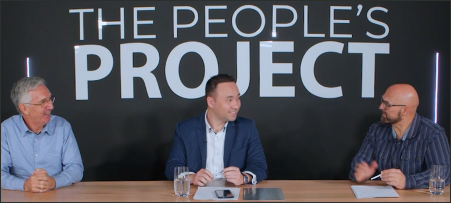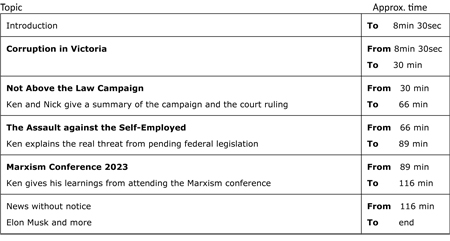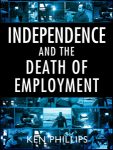 We thought we’d give you an understanding of the mechanics of our campaign to try and stop the Albanese government from implementing its ‘employee-like’ agenda.
We thought we’d give you an understanding of the mechanics of our campaign to try and stop the Albanese government from implementing its ‘employee-like’ agenda.
We explained early in May that the government had started the implementation process with the release of the Department of Employment and Workplace Relations’ (DEWR) consultation paper.
Our first task was to assess and respond to the paper. We lodged our long submission (11,000 words) to DEWR and in late May provided you a brief overview. The reason for the long submission is simple. The government is throwing up a concept—‘employee-like’—which at first glance could appear reasonable. But it’s only when you delve into the detail of what this means that a full understanding is possible. And it means a direct attack upon your right to be your own boss, to be self-employed.
The next phase in our campaign started last week. This involves focusing on the independent Senators that the government needs to pass any legislation in the Senate. There are seven independent Senators. The government needs four of them to pass legislation.
Last week we began the engagement process with the Senators. It needs to be understood that all Senators and MPs are incredibly busy trying to comprehend a huge range of complex issues. Our responsibility is to present our arguments clearly, factually and as concisely as possible. To this end we’ve produced a four-page summary of our position.
Last week we had initial discussions with staff of some Senators and had one Senator ask us to come to Canberra to explain the issues in person. We did this and had a very productive discussion. It was pleasing to have this level of interest.
We’ve been conducting pro-self-employed advocacy campaigns for over 20 years and we’ve learnt one thing. It’s essential to sit down with Senators and MPs and explain one’s position face-to-face. We’re committed to this. And it’s not just independent Senators we seek to talk to, but also the government itself, the opposition and independent MPs.
This costs money, of course, and this is where your membership fees go.
For example, a one-day trip to Canberra (from Melbourne) usually involves:
- $500 in airfares, $100 for buses, taxis, etc.
And staying overnight in Canberra (if needed) is expensive during Parliament sitting days—usually starting at around $250 a night (just for basic accommodation!!!)
The government plans to introduce its contentious legislation later this year. To run our advocacy campaign, we anticipate that around eight to ten trips to Canberra will be required before years’ end.
If you’d like to help fund any of those trips, you can do so through our dedicated campaign membership link here.
There’s quite a ‘battle’ going on, with the ACTU (unions) putting out a very aggressive ‘research’ paper which attacks the High Court and is hugely misleading on many fronts. It’s this sort of thing that we need to explain to Senators and MPs otherwise the union agenda will prevail.
We’ll keep you informed.
 We
We  We’ve
We’ve  This is to alert SEA members and subscribers about new laws affecting you if you earn income through ‘gig’ platforms. As of 1 July 2023, the platforms will be required to report your income to the Australian Taxation Office. The move is directed to identifying undeclared income and will eventually apply to GST compliance.
This is to alert SEA members and subscribers about new laws affecting you if you earn income through ‘gig’ platforms. As of 1 July 2023, the platforms will be required to report your income to the Australian Taxation Office. The move is directed to identifying undeclared income and will eventually apply to GST compliance. At Self-Employed Australia we’re covering what seems to be a wide range of topics. In fact, these all come back to a central ‘thing’ that we seek to protect—namely, your right to be self-employed should you wish. That is, your right to Be Your Own Boss.
At Self-Employed Australia we’re covering what seems to be a wide range of topics. In fact, these all come back to a central ‘thing’ that we seek to protect—namely, your right to be self-employed should you wish. That is, your right to Be Your Own Boss.

 I let you know a little while ago that I’ve started posting as a Substack writer. Substack is for obsessive writers (like me). I’ve called my Substack
I let you know a little while ago that I’ve started posting as a Substack writer. Substack is for obsessive writers (like me). I’ve called my Substack  I explain that:
I explain that: This article looks at the labour academic argument that self-employed people can be a ‘little bit an employee’. I explain that:
This article looks at the labour academic argument that self-employed people can be a ‘little bit an employee’. I explain that: You may not be aware that I published a book on this in 2008. I’ve decided to make this available through Substack in serialised, chapter format. I’ll progressively release chapters. In this first release I provide the book’s Introduction. In it I quote Roman Emperor Caligula who stated:
You may not be aware that I published a book on this in 2008. I’ve decided to make this available through Substack in serialised, chapter format. I’ll progressively release chapters. In this first release I provide the book’s Introduction. In it I quote Roman Emperor Caligula who stated: The Albanese government’s determination to legislate an ‘employee-like’ definition will introduce radical law that will deny protections to Australia’s self-employed people.
The Albanese government’s determination to legislate an ‘employee-like’ definition will introduce radical law that will deny protections to Australia’s self-employed people. There is no doubt that, in the second half of this year, major legislation is going to be pushed through Federal Parliament that will do harm to self-employed people.
There is no doubt that, in the second half of this year, major legislation is going to be pushed through Federal Parliament that will do harm to self-employed people. In late October this year the Victorian Labor Government announced new gig laws it intends to introduce. The promised laws have all the nice-sounding language of ‘rights’ for gig self-employed people, but in fact the laws amount to a stripping of rights.
In late October this year the Victorian Labor Government announced new gig laws it intends to introduce. The promised laws have all the nice-sounding language of ‘rights’ for gig self-employed people, but in fact the laws amount to a stripping of rights. Despite the Albanese government’s description of self-employed
Despite the Albanese government’s description of self-employed